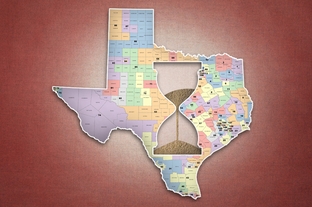Redistricting Decisions Handed Down in Texas and D.C.

This week saw a couple of interesting developments in the ongoing court challenges to the electoral maps drawn up in 2011.
Many moons have passed since then, of course, as have several iterations of the maps themselves. With the court fight threatening the 2012 primary calendar, the judges presented a set of interim maps under which those primary elections were conducted. They were then largely incorporated by the Legislature last year into its enacted maps that were used for this year’s elections.
The other big intervening development, of course, was the U.S. Supreme Court’s decision that invalidated an underlying mechanism that allowed the preclearance section of the Voting Rights Act to function.
With all that in mind, the three-judge federal panel in San Antonio that has been dealing with this legal fight since the beginning issued a ruling this week dealing with both the 2011 and the 2013 maps.
The state has been asking for the judges to declare legal action on the 2011 maps to be over because they were supplanted by the set of maps adopted last year. The judges, though, disagreed that those 2011 maps are no longer relevant.
“Evidence submitted by Plaintiffs and the United States,” the judges wrote, “indicates that the Legislature adopted the 2013 plans at least in part in an attempt to end this particular litigation, not because it conceded the any of its actions were wrongful or because it had abandoned any intent to engage in the same conduct.”
There’s enough of the 2011 maps in the newly adopted plans, the judges said, to make them relevant to the claims being pursued by the plaintiffs. The judges cited, for instance, claims of vote dilution in the Fort Worth-based HD-90 adopted last year.
The judges ruled against the plaintiffs, though, in their attempt to advance a political gerrymandering claim against the 2013 maps. The reason given by the judges was that the plaintiffs failed to name a standard by which a claim of gerrymandering would be judged.
The judges noted that the plaintiffs were asking to introduce facts during a trial to help create a standard. But the judges weren’t willing to grant the plaintiffs that level of flexibility.
The standard must come first, the judges wrote, and “the development of facts should alter only the application of the established standard.”
*****
It’s generally not a good sign for your side when a judge begins an order this way: “This matter presents a case study in how not to respond to a motion for attorney fees and costs.”
But that’s how D.C.-based U.S. District Judge Rosemary Collyer began her order handed down yesterday that awarded nearly $1.1 million to the three intervenors who challenged the state’s actions in redistricting.
Collyer singles out the state’s response or, perhaps more accurately, lack of a response in arriving at her ruling.
“Texas basically ignores the arguments supporting an award of fees and costs,” she wrote. “In a three-page filing entitled ‘Advisory,’ Texas trumpets the Supreme Court’s decision, expresses indignation at having to respond at all, and presumes that the motion for attorney fees is so frivolous that Texas need not provide further briefing in opposition unless requested.”

